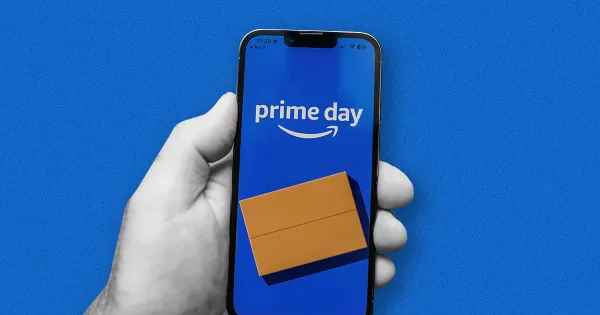Amazon is making its biggest bet this year on its annual sales bonanza, expanding the two-day Prime Day event to four days, from July 8 to 11.
Brands are preparing for a Prime Day sales surge by increasing ad budgets to promote their discounts, while Amazon sales people are attempting to boost ad spend by making personalized suggestions to specific brands around the occasion.
However, brands are being more cautious this year than in recent years, due to anticipated tariffs and a potential drop in consumer spending.
READ MORE: Amazon Ads And Roku Sign Landmark Agreement, Giving Brands Access To 80% Of Connected-TV Households
“The length of the event is two times longer than it was last year, but that doesn’t mean all of our clients are doubling up on the volume of sales they’re expecting,” said Joe O’Connor, senior innovation and growth director at ad agency Tinuiti, which expects a 10% to 25% increase in Prime Day ad spend year on year. “The economic environment is weighing on both consumers and brands.”

In the weeks preceding up to Prime Day, Amazon sales professionals advised advertisers on how much they should spend to promote their Prime Day offers and stand out from the crowd.
According to a pitch deck delivered to an agency and reviewed by ADWEEK, Amazon this year recommended that a company increase their daily ad expenditure by 25% in the days running up to Prime Day to raise awareness and discover new customers.
During Prime Day, Amazon suggested raising daily ad spending by 100%. In the days following Prime Day, Amazon recommended a 25% increase in daily spending to retarget customers who purchased products or browsed but did not buy.
READ MORE: Amazon And Nintendo’s Not-So-Secret Rivalry Keeps Getting Messier
According to the insider who received the pitch deck, these recommendations accounted for a fifth of the brand’s monthly spend on each day of Prime Day. Last year, this source spent 22% of their monthly budget on each of the two days, totaling 44% of their monthly spend.

Tinuiti’s O’Connor was not shown Amazon’s pitch deck, but he stated that the budget breakdowns “are not terribly far off from what our team would recommend.” He stated that individual advertisers’ budgets varied greatly.
According to Amazon Ads, the recommendation in the pitch deck was personalized for a single advertiser and does not apply to other advertisers.
A spokesman for Amazon Ads stated that Prime Day is “a proven opportunity to increase brand awareness, consideration, sales, and engender longstanding customer relationships,” and that Amazon collaborates with advertisers to provide Prime Day ad recommendations.
Too many sales make Prime Day less effective.
While some marketers follow Amazon’s advised spending guidelines, others buy advertisements elsewhere, according to Hillary Kupferberg, VP of performance advertising at Exverus advertising. Retailers such as Walmart and Target are providing comparable bargains during Prime Day, raising competition for ad spending, she added.
According to Kupferberg, some advertisers are hesitant to spend money on Prime Day because it falls between Fourth of July sales and back-to-school purchasing. The constant barrage of offers may have worn down consumers.

“It reinforces how cluttered we are and how much competition there is,” Kupferberg told me. “Everyone understands that it’s an uncertain economic time, but nobody is quite sure how that will play out.”
Mike Feldman, svp of commerce at Flywheel, noted that the timing of this year’s Prime Day could help Amazon improve sales leading into the holidays, when some analysts predict a drop in consumer spending.
“Amazon is going to try to maximize their inflationary impact,” he told me. “Shoppers have more time to make purchases—this is to make sure that they win Q3 and mitigate risk heading into the holidays.”
Due to economic worries, brands continue to closely monitor their advertising budgets.
“The ultimate thing that we’re hearing is that the ad budgets need to be more effective than ever before,” Feldman informed us.
He emphasized that the benefits of Prime Day might be significant for firms wanting to get ahead of holiday sales.
“If you win Prime Day, you win ranking and could be competitive for the rest of the year,” he informed us.
Step into the ultimate entertainment experience with Radii+ ! Movies, TV series, exclusive interviews, live events, music, and more—stream anytime, anywhere. Download now on various devices including iPhone, Android, smart TVs, Apple TV, Fire Stick, and more!


